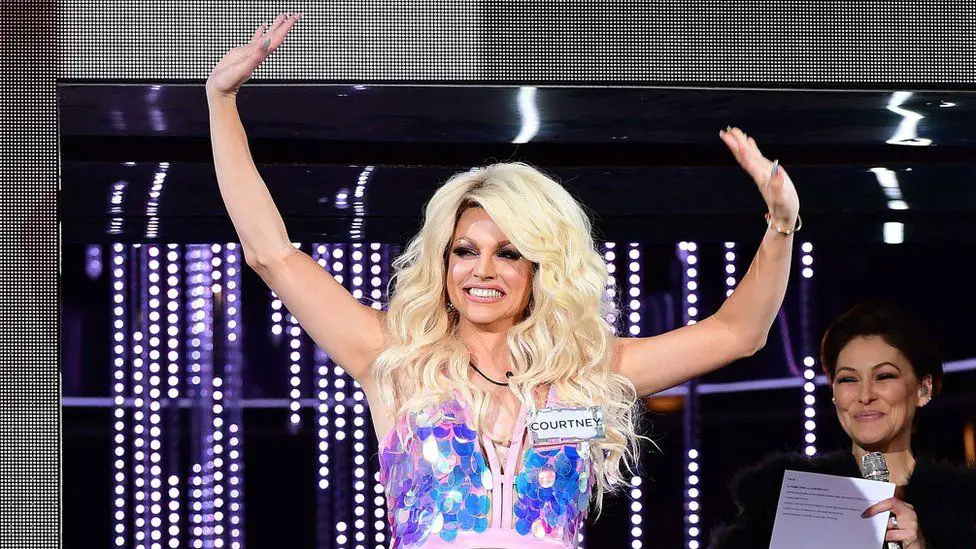Earlier this month, Australian drag star Courtney Act won “Celebrity Big Brother 21,” which is dubbed “Celebrity Big Brother: Year of the Woman.” Act, whose real name is Shane Jenek, redefined what it means to be either a man or a woman, showing viewers that it’s okay if they don’t fit into the binary system.
Identifying as gender fluid, Shane Jenek has been using Courtney Act as a way to explore gender since 2003, appearing on television programs such as “Australian Idol,” “RuPaul’s Drag Race” and “Single AF.” While on these shows, the star exclusively used the name Courtney Act and relatively stayed out of the spotlight as Shane Jenek, but because the premise of “Celebrity Big Brother” involves exploring the lives of famous people from behind the curtain, the show gave fans a chance to know both sides of the drag star.
From the moment she made her debut appearance on the show, Act caught the attention of viewers at home with a “wardrobe malfunction” that left her without a skirt. Instead of acting embarrassed, however, Act laughed the incident off and continued with the program. Notably, she carried her positive attitude with her throughout her time at the CBB house.
As soon as Act joined the house, viewers at home were interested to see how the star would interact with the other contestants, especially with Ann Widdecombe, a former stateswoman who voted against pro-LGBT legislation. When Act and Widdecombe became the last two contestants on the show, it became clear that the competition was more than just a battle between two celebrities.
Instead, it was a clash between two mindsets: conservative versus progressive. Without a doubt, their opposing viewpoints were not only sources of good entertainment but also educational tools for audiences at home.
In one of Widdecombe and Act’s first conversations together, the two talked about gender inequality and the #MeToo movement, with Widdecombe calling the movement a sign of “whimpery” by women. While not performing as Act, Shane Jenek tried to reason with Ann and explain to her that women not only have the right to be angry, but they also have the right to be calling out men for their inappropriate behavior.
Ann refused to listen and insisted that women have been “destroying” men as much as men have been “destroying” women. Their conversations afterward would follow the same pattern: Act would approach the conversation in a calm manner, but Ann would try to make her viewpoint the dominant and correct one.
In one of the final episodes, Act had a conversation with contestant Wayne Sleep who, despite being gay, told Act to stop being so “serious” and to tone down her viewpoints in the presence of Widdecombe. Act disputed that her intention is not to change Widdecombe’s mind but to change the minds of viewers at home.
When talking about Widdecombe, Act says, “Imagine if you were some young gay boy who’s 14-years-old, who hasn’t told anybody that he likes boys, and then he sees Ann. Think about that. Think about the message that sends out.” Similar to her conversations with Widdecomb, Act remains calm while talking to Sleep, trying to make him realize the implications Widdecombe’s remarks have on viewers.
Sleep wasn’t the only member of the LGBTQ+ community on the show who didn’t follow in Act’s activism. India Willoughby, a trans woman, faced misgendering during her time on the show, but rather than educating the contestants about what it means to be transgender, she remained quiet. Act, being the activist that she is, took the opportunity to educate the contestants herself.
In one of the most popular scenes of the season, Act has a conversation with a few straight male contestants about why Willoughby came in the CBB house feeling uncomfortable with Act’s drag queen performance. She said it was likely because “someone might see me [drag queen] and see her [trans woman] and think we’re the same thing.”
The male contestants then asked if prior to Willoughby’s operation to transition, she would have been considered a drag queen. Act explained that drag is different from being trans because drag is a performance, while trans has to do with one’s gender identity.
The men struggled to understand and asked, “Did she dress as a woman when she was a man, though?” Act explained further that Willoughby was never a man, but she had a man’s body. The difference between the two is that Act doesn’t want to be a woman, and if gender is on a spectrum, she would be somewhere in the middle.
With every question that the male contestants had, Act remained patient and even encouraged them to ask more. Instead of belittling them for saying something wrong, she calmly corrected them and used their ignorance as an educational opportunity. She understood that the men may not be familiar with certain terms, and as long as they made an attempt to learn, that was okay.
During her time on the show, Act also developed an unlikely friendship with male contestant John Barnes. Even though some viewers saw some of Barnes’ comments as homophobic, Act admitted that she loved talking to him because he would tell her about why he held these views, explaining that his parents and peers influenced him to think this way. In an interview with iNews, Act says “acknowledging that is the first step to moving through it.”
Act’s relationship with another male contestant, Andrew Brady, also had people talking at home, mainly because Brady, who identifies as a straight man, developed a flirtatious relationship with Act/Jenek, who identifies as pansexual and genderfluid. Brady proved that Act’s time on the show ignited conversations about gender and sexuality, even when she wasn’t in the room.
In one scene, Brady had a conversation with contestant Dapper Laughs about Act. He said that during the talent show, Act was appreciative of the fact that both men and women on the show were cheering for her, something that Brady suspects Act rarely experienced in the past.
Brady says, “We’re like ‘yeah you’re just one of the f*cking lads. You’re wearing f*cking six-inch heels, bum implants, fake tits and a face full of makeup and a wig but you’re one of the lads.” To see a straight, white male talk about gender openly on television is a rare occurrence, and the fact that Act was encouraging so many male contestants to do so was significant.
When Act was finally declared the winner of “Celebrity Big Brother,” the victory became part of something much larger than just a win for the most entertaining celebrity; her victory was a win for the entire LGBTQ+ community in terms of representation, as it was the first time that a drag queen ever won the show.
By having Act and Widdecombe as the final two contestants, the competition became symbolic of the battle between progressive and traditional views. Their opposing opinions showed that although many people are becoming more accepting of the gay community, there is still a fair amount of people who hold Widdecombe’s conservative views regarding LGBTQ+ issues.
With Act drawing in more votes than Widdecombe, however, LGBTQ+ people are hopeful that the world has the potential not only to listen to the concerns of the LGBTQ+ community but also to change their opinions and behaviors. Act certainly changed the minds of a few contestants on the show, and one can only imagine how many minds she changed of viewers watching at home.

















